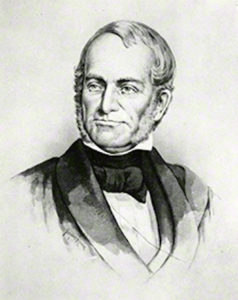
James Birney
*James G. Birney was born on this date in 1792. He was a white-American abolitionist and politician who was a slave owner.
From Danville, Kentucky, James Gillespie Birney graduated from the College of New Jersey (now Princeton University) in 1810, where he studied law, and moved to Alabama, where he made lots of money in his profession as a district attorney. In February 1818, he moved his family to Madison County, Alabama, where he purchased a cotton plantation and slaves, most of whom came from Kentucky.
Having his attention turned toward the question of property in slaves, in 1833, he organized a branch of the Colonization Society for the State of Alabama and Kentucky; he became president. In 1834, he supported the cause of immediate emancipation of slaves in a public correspondence, “Letter on Colonization.” This was followed by speeches at American Churches, the Bulwarks of American Slavery, speeches in England, and an Examination of the Decision of the United States Supreme Court in the Case of Strader et al. v. Graham.
Birney tried to establish a newspaper to circulate these views in his hometown, where he held a professorship at the university. He found printing such a paper in Kentucky impossible and moved across the Ohio River to Cincinnati. There, he began to issue The Philanthropist newspaper. This had not been published before it was found no less obnoxious, and the printing press was thrown into a river. However, the editor was able to revive the paper for use as a political instrument.
In 1836, he went to New York as the secretary of the American Anti-Slavery Society and devoted his time and strength to publishing further letters and articles for many years. He wanted to build up a political party, later called the Liberty Party, on the single question of slavery to act upon the government within the forms of the Constitution. He was absent in England but was nominated by his party in 1840. His candidacy met little success, but he was again nominated in 1844 when he received more votes. It was charged upon his friends that by electing him, they accomplished the election of James Polk by pulling from other candidates. He died on November 25, 1857.